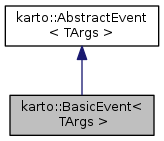#include <Event.h>
Inheritance diagram for karto::BasicEvent< TArgs >:

Public Member Functions | |
| BasicEvent () | |
| virtual | ~BasicEvent () |
 Public Member Functions inherited from karto::AbstractEvent< TArgs > Public Member Functions inherited from karto::AbstractEvent< TArgs > | |
| AbstractEvent () | |
| AbstractEvent (const DefaultStrategy< TArgs > &rStrategy) | |
| void | Clear () |
| void | Disable () |
| void | Enable () |
| kt_bool | IsEmpty () const |
| kt_bool | IsEnabled () const |
| void | Notify (const void *pSender, TArgs &rArgs) |
| void | operator() (const void *pSender, TArgs &args) |
| void | operator+= (const AbstractDelegate< TArgs > &rDelegate) |
| void | operator-= (const AbstractDelegate< TArgs > &rDelegate) |
| virtual | ~AbstractEvent () |
Private Member Functions | |
| BasicEvent (const BasicEvent &e) | |
| BasicEvent & | operator= (const BasicEvent &e) |
Additional Inherited Members | |
 Protected Attributes inherited from karto::AbstractEvent< TArgs > Protected Attributes inherited from karto::AbstractEvent< TArgs > | |
| kt_bool | m_Enabled |
| Mutex | m_Mutex |
| DefaultStrategy< TArgs > | m_Strategy |
Detailed Description
template<class TArgs>
class karto::BasicEvent< TArgs >
A BasicEvent uses internally a DefaultStrategy which invokes delegates in an arbitrary manner. Note that an object can only register one method to a BasicEvent. Subsequent registrations will overwrite the existing delegate.
BasicEvent<int> event;
MyClass myObject;
event += karto::delegate(&myObject, &MyClass::myMethod1);
event += karto::delegate(&myObject, &MyClass::myMethod2);
The second registration will overwrite the first one. The reason is simply that function pointers can only be compared by equality but not by lower than.
Constructor & Destructor Documentation
template<class TArgs>
|
inline |
template<class TArgs>
|
inlinevirtual |
template<class TArgs>
|
private |
Member Function Documentation
template<class TArgs>
|
private |
The documentation for this class was generated from the following file: